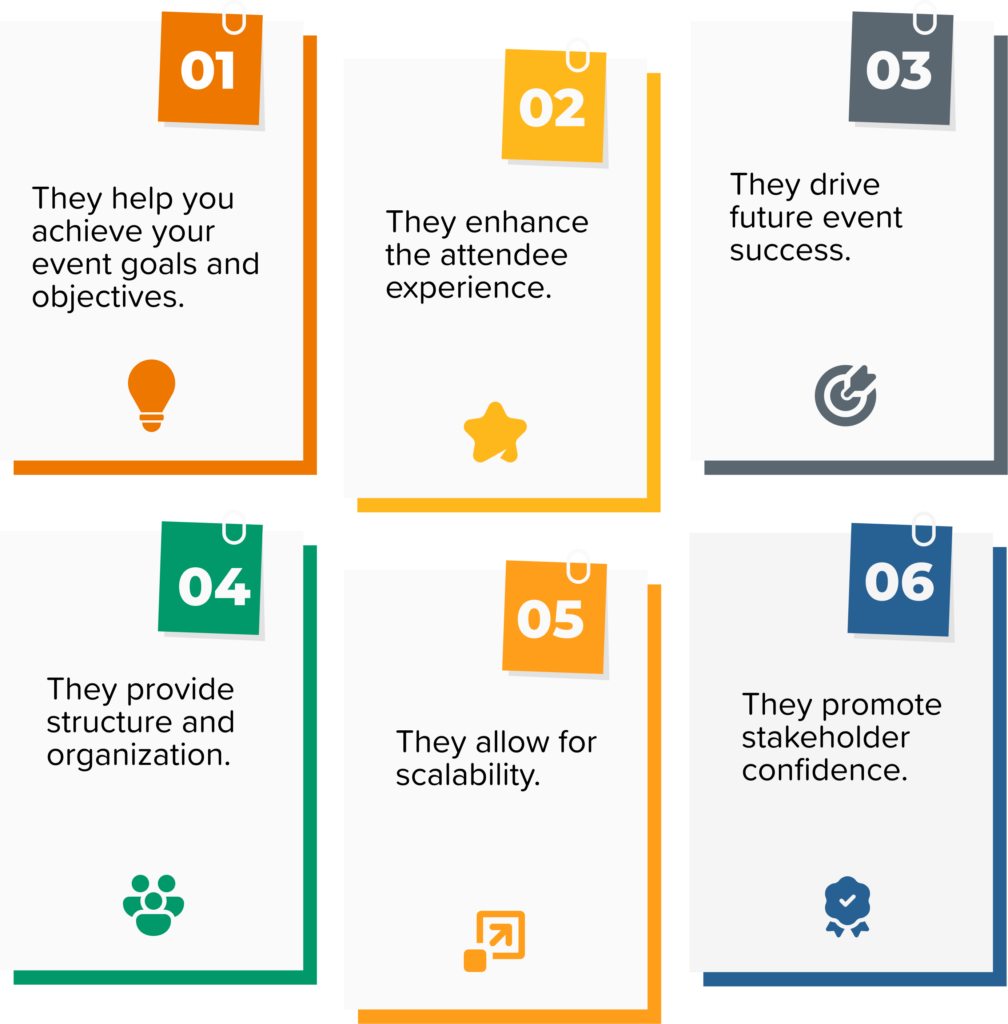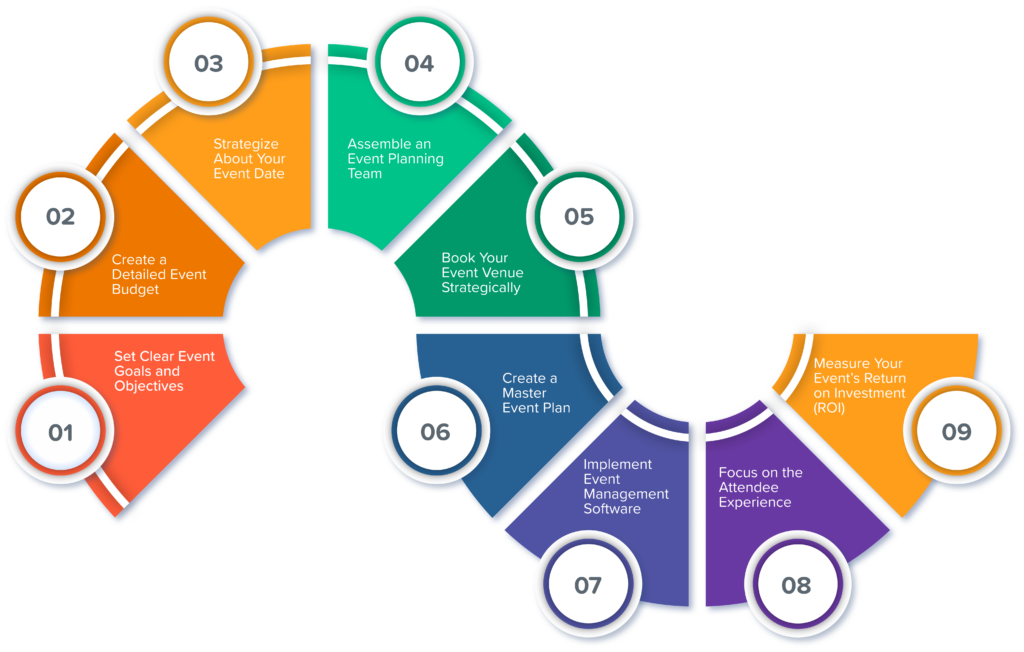Event Management Best Practices: The Ultimate Guide
Event management is the process of overseeing and coordinating all aspects of an event, from conception to completion. This process includes planning, organizing, and delivering the event to ensure it runs smoothly and successfully meets your objectives.
With so many different tasks on your plate and stakeholders to cater to, managing events is a tall order. To stay on top of everything, you need a clear strategy that incorporates event management best practices to guide you.
Curious to learn how you can use event management best practices to create more impactful events in the long term? Read on to explore event management best practices that allow you to both delight your attendees and achieve your organizational goals.
Recommended Resource: Using event technology is one of the top best practices for running successful events. To see how quickly you can put event technology to work for you, watch How to Get Started with an Event App of Your Own (In 6 Easy Steps!) 📺
Having sound event management best practices in place is crucial for several reasons:

- They help you achieve your event goals and objectives. Proper event management best practices enable you to effectively work toward your event goals like increasing registrations, generating revenue, and building brand awareness.
- They enhance the attendee experience. Focusing on critical details and contingency planning best practices will create a smoother event experience for attendees—and ensure they remember an event for all the right reasons.
- They drive future event success. Documenting processes and lessons learned allows you to continually improve your events. You can use established best practices to create a knowledge base that informs your future event strategy and execution.
- They provide structure and organization. Detailed plans, timelines, and procedures inherent in best practices give you a reliable framework to operate within and help coordinate all the moving parts.
- They allow for scalability. You can replicate solid best practices—with modifications—as your events program grows or changes over time. This scalability ensures more efficient growth.
- They promote stakeholder confidence. Sponsors, vendors, staff, and leadership can have greater confidence that your event will meet its objectives when following industry best practices.
Top Event Management Best Practices
Whether you’re planning a large-scale conference or a smaller event like a seminar, incentive trip, or sales kickoff, it pays off to follow tried-and-tested processes. The event management best practices below will help set you up for success from the beginning of your event planning process right through to event day.

1. Set Clear Event Goals and Objectives
Before planning an event, it’s important to set clear goals and objectives that align with your organization’s overall business goals. Well-defined goals provide direction for your event planning process and help you measure success after the event concludes.
For example, common event goals include generating leads, increasing brand awareness, educating customers about a new product or service, or building relationships with stakeholders.
Start brainstorming your event’s goals by asking yourself key questions:
- Why are you holding this event?
- What do you hope to achieve?
- Who is the target audience?
- How does this event align with your business objectives?
Once you’ve determined your general event goals, clarify them using the SMART goal framework, which stands for specific, measurable, achievable, relevant, and time-bound. Setting focused, quantitative goals with clear metrics to track will allow you to better evaluate the impact of your events.
2. Create a Detailed Event Budget
Having a budget in place early on in the event planning process helps your event team work efficiently within the prescribed resources, easily track expenses, and make adjustments as needed.
When creating your event budget, be sure to account for all potential costs including:
- Venue, including rental fees and any necessary insurance or permits
- Catering, including food and beverage for staff, exhibitors, and attendees
- Marketing initiatives, including advertising, programs, signage, and social media campaigns
- Staffing, including staff travel and lodging costs
- Entertainment, including costs for speakers, musical acts, or any other entertainment features.
- Rentals, such as tables, chairs, linens, tents, lighting, and sound equipment
- Decor for your venue
- Transportation for staff and/or attendees
- Miscellaneous expenses
To help you do more with your resources and optimize your budget, we recommend getting estimates from different providers to compare your options. Consider working with local vendors to help lower costs associated with shipping (and contact them well in advance!) so you can plan the perfect event while staying within your organization’s financial resources.
3. Strategize About Your Event Date
Choosing the right date for your event is crucial for success. You want to give yourself enough lead time to properly plan and promote the event while also avoiding dates that conflict with holidays, school breaks, or other major events that may prevent your audience from attending.
When picking an event date, keep these tips in mind:
- Give yourself at least 4-6 months of planning time if possible. Major conferences and trade shows often require a year or more of advanced planning. Even smaller events need several months of preparation.
- Check for conflicting holidays, observances, or cultural events on your potential date that may prevent participation. Look up statutory holidays as well as religious or cultural celebrations that are important to your target audience.
- Avoid major school holiday periods when potential attendees may have travel plans. These include summer vacation, spring break, and winter holidays in December. If your event depends on students, plan around their academic calendar.
- Research other events happening locally, regionally, or nationally that may compete for the same audience. Check industry calendars for conferences, trade shows, or public events you’ll be competing with for attendance.
- Confirm date availability with all key participants like speakers, VIPs, honorees, or organizational leaders before cementing the date to accommodate their schedules.
- Be flexible on potential event dates in the planning phase. This gives you some leeway in booking the venue you want or aligning with participants’ availability.
Choosing an event date may seem simple, but it requires thoughtfulness and planning. Avoid last-minute choices or picking a date for convenience. Take the time upfront to maximize attendance by selecting an event date that works for your goals, audience, and other stakeholders.
4. Assemble an Event Planning Team
A successful event requires an organized team to ensure you handle every detail properly. Assemble your event planning team by assigning clear roles and responsibilities to each member. Some key roles to fill include:
- Event Manager: This person oversees the entire event planning process from start to finish. They are the main point of contact and coordinate with all vendors, staff, and stakeholders. The event manager creates the master event plan and detailed schedules and timelines.
- Event Marketer: The event marketer oversees all event promotion including email campaigns, social media, paid ads, public relations activities, and more. They are responsible for spreading awareness and driving event registrations.
- Volunteer Coordinator: This person recruits and organizes event volunteers. Key duties include determining volunteer needs, creating duty schedules, conducting training, and managing volunteers during the event.
- Program Manager: The program manager creates the overall event agenda, schedules speakers and presenters, plans entertainment and activities, and manages program content.
- Accountant: The accountant manages the event budget, tracks expenses, processes payments to vendors, and handles all financial matters.
- Registration Manager: This person oversees the event registration process including website forms, payment collection, name badges and credentials, and attendance tracking.
Clearly define each team member’s responsibilities, and hold regular meetings to keep the team aligned on event progress as the big day approaches.
5. Book Your Event Venue Strategically
Your venue sets the stage for every other element of your event. Consider the following when selecting a venue:
- Size: Make sure the venue has enough space to comfortably accommodate your expected number of attendees. Evaluate the main event space as well as the potential for breakout rooms, lobby space, or specific networking sections.
- Amenities: What features does the venue offer? Look at basics like tables, chairs, and A/V equipment. Also consider extras like catering capabilities, free parking, and WiFi.
- Insurance & Permits: Check if any special insurance or permits are required to host your event at the venue, and factor these costs into your budget.
- Accessibility: Ensure the venue is accessible to all potential attendees. Look for wheelchair ramps, elevators, gender-neutral restrooms, and accommodations for service animals.
Selecting the right venue sets the foundation for a successful event. Take time to thoroughly evaluate all options before signing any contracts.
6. Create a Master Event Plan
A master event plan is essential for pulling together all aspects of your event and ensuring everything stays on track. Your master plan should cover the following details:

- Event Timeline: Map out your entire event planning timeline, including when contracts, permits, and insurance need to be submitted, when registration closes, and a detailed schedule for the day of. Build in buffer time for potential delays.
- Vendor Contacts: Compile a list of all your vendors for the event with their associated contact information, services provided, and contract details. Having all of this information in one place makes it easy to communicate with vendors leading up to the event.
- Marketing Plan: Outline your strategies for promoting the event through email, social media, event listings, advertisements, and other channels. Include key dates and details for each initiative.
- Event Agenda: Develop a detailed schedule for your event programming and activities. Include session topics and times, speaker names, and room assignments.
- Volunteer Needs: Determine how many volunteers you’ll need, what their responsibilities will be, and who will manage them. You should also include recruitment and training timelines.
Having a comprehensive master event plan is crucial for assigning accountability, coordinating across teams, and ultimately executing a smooth, successful event. Treat it as your North Star guiding you through each stage of planning.
7. Implement Event Management Software
Event management software automates tedious tasks and streamlines your workflows. The right event platform can facilitate everything from registration, ticketing, badge design, and check-in, to Mobile Event Apps for your attendees and post-event reporting, freeing up your time to focus on other critical areas.

When evaluating event management platforms, look for these key features:
- Event website builder to create a custom website for your event with all key details.
- Registration management features, like easy-to-build custom registration forms, payment processing, and automated confirmation emails.
- Email marketing tools to create and send targeted email campaigns to promote your event
- Badge printing and check-in so you can pre-print your badges or offer onsite printing at guest arrivals and check your attendees into the event.
- Mobile Event Apps that allow attendees to access schedules, maps, exhibitor information, networking features, appointment booking, and session content on their own mobile devices.
- Ongoing communication. The Event App should allow you to send emails, push notifications, and alerts directly to attendees so you can engage your audience before, during, and after your event.
- Reporting and analytics tools to gain insights on engagement and performance at every stage of your event.
The best event management software centralizes all your tools and data into one unified platform. This eliminates having to juggle multiple systems and enables seamless collaboration across your team. Be sure to evaluate integration capabilities as well in case you need to connect with external tools like email providers, payment gateways, or your constituent relationship management platform (CRM).
EventMob’s comprehensive event management platform offers all of the features listed above–and then some! Investing in a robust event management platform allows you to streamline your workflows and ensure your events run smoothly and efficiently. To see what’s possible with the right platform in place, check out EventMobi’s self-guided Product Tour.
Want to see event management software in action? Watch the EventMobi Product Tour to learn how to create, promote, monetize, and deliver incredible event experiences! 👀
8. Focus on the Attendee Experience
Creating an exceptional experience for your event attendees should be a top priority. There are several ways to delight your attendees and make your event engaging and memorable.
- Personalize the experience. Get to know your attendees before the event by having them fill out surveys during registration. Ask about their interests, organizational roles, and goals for attending. Use this data to customize parts of the event for each attendee. For example, you can provide personalized session recommendations based on someone’s role and interests.
- Offer a Mobile Event App. A mobile app allows for a more seamless and personalized attendee experience. Attendees can access schedules, maps, speakers, and networking features from any mobile device. You can also send push notifications about changes and upcoming sessions. A well-set-up app will foster a stronger connection between attendees and your event.
- Encourage engagement. Incorporate interactive elements into your event to get attendees involved. Live polls, Q&As, games, challenges, and group activities are great ways to engage different types of attendees. Also, prompt experience sharing on social media with your event hashtag and in your Mobile Event App by encouraging attendees to post photos and thoughts in Group Discussions or Activity Feeds.
- Facilitate networking. Don’t underestimate the importance of networking and social moments. Build in plenty of dedicated time for open networking sessions, group meals, mixers, and interactive activities. Attendees will appreciate the ability to connect, share ideas, and form new relationships.
Remember that the attendee experience goes beyond the event itself. You can continue to build relationships with your audience in between events by thanking them for coming, sending out post-event surveys to collect feedback, and continuing to offer educational resources and engagement opportunities.

9. Measure Your Event’s Return on Investment (ROI)
Determining the ROI for your event requires assessing the event’s outcomes against its original goals and objectives. This practice provides tangible metrics to measure success.
When calculating event ROI, remember to:
- Track event data and metrics. Look at numbers like event registrations and attendance, social media reach and engagement, surveys completed, leads generated, and revenue gained. Compare this data to the goals you originally set.
- Gather feedback. Send post-event surveys to attendees, staff, speakers, sponsors, and other stakeholders. Ask questions to find out what resonated with them, what could be improved for next time, overall satisfaction levels, and their willingness to return or recommend your organization’s events to others.
- Review speaker and session ratings and comments. See which sessions had the highest attendance and received positive feedback. This data provides insight into what content and topics appealed most to your audience.
- Assess sponsorship ROI. Look at metrics provided on visibility and engagement with sponsor booths, materials, social media, signage, and sessions. Evaluate which sponsorships delivered the most value.
- Analyze marketing and promotion efforts. Determine which initiatives drove the most registrations and engagement such as social campaigns, email blasts, print ads, and referral programs.
By gathering data, feedback, and insights across all event elements, you’ll gain a holistic picture of what was successful, what missed the mark, and what you can adjust to improve future events. This assessment process is key to continually enhancing the attendee experience and exceeding stakeholder expectations.
Keep These Event Management Best Practices in Mind
Ready to unlock the full potential of your events program? Follow the best practices outlined above and you’ll be well on your way to running impactful events that deliver value to attendees, sponsors, and stakeholders alike!
Follow event management best practices with the top event management software. EventMobi has all the features you need to make your event a success! ✨






